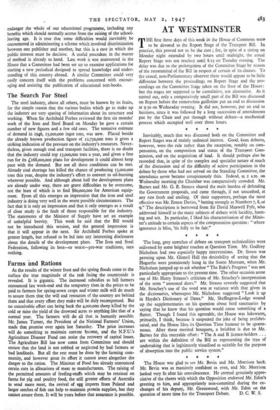AT WESTMINSTER
THE first three days of this week in the House of Commons were to be devoted to the Report Stage of the Transport Bill. In practice, this proved not to be the case ; for, in spite of a sitting on Monday night extended by two hours until midnight, the actual Report Stage was not reached until 8.15 on Tuesday evening. The delay was due to the prolongation of the Committee Stage by reason of the recommittal of the Bill in respect of certain of its clauses. To the casual, non-Parliamentary observer there would appear to be little difference between the proceedings on Report Stage and the pro- ceedings on the Committee Stage taken on the floor of the House: but the stages are supposed to be cumulative, not alternative. As it turned out, only a comparatively small part of the Bill was discussed on Report before the remorseless guillotine put an end to discussion at 9.3o on Wednesday evening. It did not, however, put an end to business, since it was followed by a long succession of amendments put by the Chair and put through without debate—a mechanical process which occupied well over three hours.
* * * *
Inevitably, much that was discussed both on the Committee and Report Stages was of mainly technical interest. Good, keen debates, however, were the rule rather than the exception, notably on com- pensation, on the composition and status of the Transport Com- mission, and on the acquisition of land. It should perhaps also be recorded that, in spite of the complex and specialist nature of much of the discussion and of the difficulty of active participation in the debate by those who had not served on the Standing Committee, the attendance never became conspicuously thin. Indeed, at 2 a.m. on Wednesday morning the Chamber was comparatively crowded. Mr. Barnes and Mr. G. R. Strauss shared the main burden of defending the Government proposals, and came through, if not unscathed, at any rate fresh and smiling. Of their supporters, perhaps the most effective was Mr. Ernest Davies, " batting strongly at Numbers 7, 8, or 9." The description is borrowed from Sir David Maxwell Fyfe, who addressed himself to the many subjects of debate with lucidity, learn- ing and wit. In particular, I liked his characterisation of the Minis- ter's attitude to certain aspects of the compensation question : " where ignorance is bliss, 'tis folly to be fair."
* * * * The long, grey stretches of debate on transport technicalities were enlivened by some brighter touches at Question Time. Mr. Godfrey Nicholson had two especially happy interventions. Dr. Stross was pressing upon Mr. Glenvil Hall the desirability of seeing that the Hogarths were prominently hung in the Soane Museum, when Mr. Nicholson jumped up to ask whether " The Rake's Progress " was not particularly appropriate to the present time. The other occasion arose out of Mr. Harry Strauss's criticism of Mr. Strachey's interpretation of the term " unstoned dates." Mr. Strauss severely suggested that Mr. Strachey's use of the word was at variance with that given in the dictionaries, whereupon Mr. Nicholson suggested " Look it up in Haydn's Dictionary of Dates." Mr. Skeffington-Lodge wound up the supplementaries on his question about bird sanctuaries by saying that he knew that his question would cause something of a flutter. Though I found this agreeable, the House was lukewarm, primarily, I think, because it suspected the joke of being prefabri- cated, and the House likes its Question Time humour to be sponta- neous. After these merited bouquets, a brickbat is due to Mr. Barnes for this execrable effort: " The A and B licence-holders . . . are within the definition of the Bill as representing the type of undertaking that is legitimately visualised as suitable for the purpose of absorption into the public service system."
* * * * The House was glad to see Mr. Bevin and Mr. Morrison back. Mr. Bevin was as massively confident as ever, and Mr. Morrison looked very fit after his convalescence. He seemed genuinely appre- ciative of the cheers with which the Opposition endorsed Mr. Eden's greeting to him, and appropriately non-committal during the ex- changes of his deputy, Mr. Greenwood, with Mr. Eden on the question of more time for the Transport Debate. D. C. W. S.


































 Previous page
Previous page